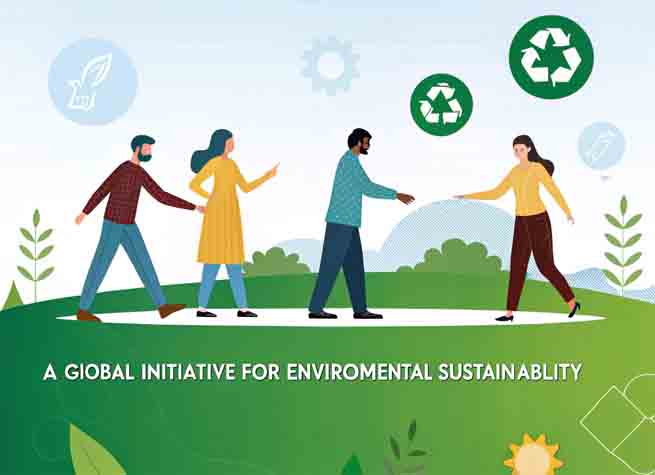Pakistan Calls for ‘Zero-Waste’ World: A Global Initiative for Environmental Sustainability
Pakistan advocates for a 'zero-waste' world, urging multilateral efforts to tackle the growing global waste crisis. UN warns of toxic waste seeping into ecosystems.
Pakistan has called for a multilateral approach to address the growing global waste crisis, urging the world to work together toward achieving a ‘zero-waste‘ future. During a special meeting at the United Nations General Assembly to mark the International Day of Zero Waste, Pakistan’s ambassador to the UN, Asim Iftikhar Ahmad, highlighted the pressing need for sustainable waste management practices. With UN officials warning about the dangers of toxin-filled waste seeping into our ecosystems, Pakistan’s message underscores the urgency of international collaboration in combating this critical environmental issue.
Pakistan’s Stand on Sustainable Waste Management
At a special event held at the UN headquarters in New York, Pakistan’s Ambassador Asim Iftikhar Ahmad emphasized the importance of adopting comprehensive and sustainable waste management solutions. The goal of achieving a ‘zero-waste’ world was a key subject discussed during the meeting, reflecting Pakistan’s commitment to addressing environmental challenges through multilateral efforts.
1. The Growing Waste Crisis: A Global Concern
According to UN officials, “toxin-filled waste is seeping into our soil, water, and air,” leading to widespread environmental degradation. The global waste crisis has reached alarming levels, threatening human health, wildlife, and ecosystems. Pakistan’s call for a ‘zero-waste’ approach aims to reduce waste generation, encourage recycling, and ensure that waste management practices are both effective and sustainable.
Example: Plastic pollution, particularly in oceans, has become one of the most pressing environmental issues, with millions of tons of plastic waste entering the oceans every year.
2. The Role of Multilateral Cooperation in Waste Reduction
Ambassador Ahmad stressed the importance of a multilateral approach, urging nations to collaborate on effective solutions for waste reduction. He emphasized that no single country can tackle the waste crisis alone, and only through collective action can a ‘zero-waste’ world be achieved. International cooperation, knowledge-sharing, and technological innovation will be crucial in developing sustainable waste management systems.
Example: Countries such as Sweden and Japan have pioneered advanced waste-to-energy technologies, which can serve as models for other nations to follow.
Global and Pakistani Perspectives on Zero-Waste Practices
As nations grapple with the environmental impact of waste, Pakistan’s advocacy for a ‘zero-waste’ future aligns with broader global trends pushing for environmental sustainability. However, it also highlights specific local challenges that need to be addressed to achieve this ambitious goal.
1. Pakistan’s National Efforts Toward Zero Waste
Pakistan has already begun implementing initiatives aimed at reducing waste and promoting sustainable practices. These include recycling programs, waste segregation policies, and public awareness campaigns designed to encourage citizens to reduce, reuse, and recycle.
Example: Pakistan’s National Zero Waste Policy is being developed to reduce plastic waste and promote circular economy models within the country.
2. Global Perspectives on Zero Waste
Countries around the world are implementing diverse strategies to move toward a ‘zero-waste’ world. The European Union has adopted regulations to reduce single-use plastics, and various global organizations are pushing for more robust policies on waste reduction and resource management.
Example: The UN’s ‘Clean Seas’ campaign encourages nations to take steps to eliminate plastic waste in the oceans, focusing on the most polluted regions.
The Environmental and Economic Benefits of Zero-Waste Practices
Transitioning to a ‘zero-waste’ world offers significant benefits, not only for the environment but also for economic growth. Here are some key advantages:
1. Environmental Benefits
Reducing waste and implementing sustainable waste management practices can help mitigate climate change, conserve natural resources, and protect ecosystems. By adopting a zero-waste approach, nations can reduce their carbon footprint and preserve biodiversity.
2. Economic Opportunities
The transition to a circular economy, where waste is minimized, and products are reused or recycled, can create new economic opportunities. Industries related to recycling, waste management, and sustainable product design are poised for growth, providing jobs and boosting local economies.
Example: The global recycling industry is expected to grow at a compound annual growth rate (CAGR) of 7.7% from 2020 to 2027, presenting significant economic potential.
How Countries Can Collaborate for a Zero-Waste Future
Achieving a ‘zero-waste’ world requires strong collaboration among governments, businesses, and individuals. Here are some ways countries can work together:
1. Strengthening International Agreements
Nations should work together through international agreements to establish common standards for waste reduction and management. Strengthening existing environmental treaties and creating new frameworks focused on waste could facilitate global cooperation on this urgent issue.
2. Sharing Technology and Knowledge
By sharing best practices, technological innovations, and research, countries can accelerate progress toward a zero-waste future. This includes the sharing of advanced recycling technologies, waste-to-energy solutions, and sustainable material management techniques.
3. Investing in Education and Awareness
Raising awareness about the importance of waste reduction and sustainability is essential to changing consumer behavior. Governments and international organizations should invest in education campaigns that promote eco-friendly practices and encourage individuals to reduce waste at every stage of production and consumption.
Internal & External Links:
- Internal Link Suggestions:
- External Link Suggestions:







